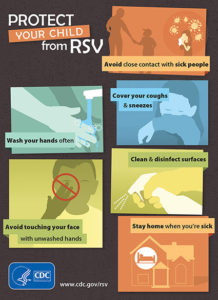For parents with infants, the holidays can be an exciting time to introduce their new additions to the family.
While relatives may want to hold and kiss your baby, parents must be mindful of the life-threatening virus that people can pass onto newborns. Respiratory syncytial virus, or RSV, is a common respiratory virus that typically causes mild, cold-like symptoms in adults, according to the Centers for Disease Control and Prevention. But for infants who are diagnosed with RSV it can be serious, causing bronchiolitis and pneumonia.
Pediatrician Dr. Cody Silker with Guthrie County Hospital says RSV usually appears as a common cold for infants in the first day or two of the illness, “And then all of a sudden usually day three or day four or five is usually the worst of RSV that’s when it usually kind of peaks I feel like. Then they will start sometimes then because they’re so congested, they’ll start to work hard, struggle to breathe, not want to eat because they can’t breathe very well so it’ll kind of progress from there. So I feel like it can sometimes start out as just a little bit of a congestion and then slowly throughout the days start to get worst.”
Silker recommends parents to contact their child’s physician if any of these symptoms arise and to seek medical treatment immediately if conditions worsen. Ways to protect your child from RSV include: washing your hands often, avoid close contact with sick people, avoid touching your face with unwashed hands, and stay home when you’re sick.


